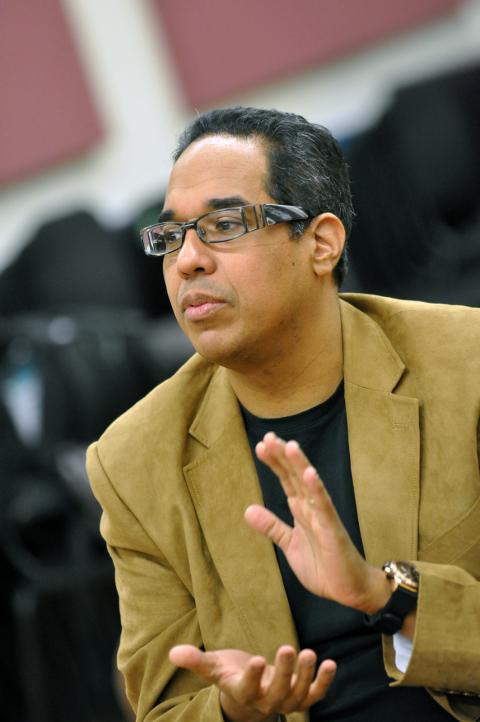Danilo Pérez '88
It’s hard to imagine a figure more responsible for putting Berklee on the world stage than Danilo Pérez ’88, artistic director of the Berklee Global Jazz Institute (BGJI). His status as a virtuosic pianist and bandleader who has released a dozen albums, and three-time Grammy winner is enough to qualify him as a top-echelon Berklee faculty member. But he also has a compelling vision for the college as a truly global musical force. Pérez has been a dynamic leader and mentor to some of the school’s most promising talent poised to change the world through music.

Danilo Perez
Phil Farnsworth
Pérez seemed destined for a brilliant music career from the start. A native of Panama, he began playing piano at just three years old. “My father was a bandleader and singer,” he recalls, “who introduced me to many records and instruments at a young age. My earliest influences were Afro-Cuban music, tango, and boleros. It was very diverse.” By age 10, Pérez was studying music at the National Conservatory of Panama and began playing professional gigs within two years.
During the early 1980s, Pérez came to the U.S. to attend Indiana University of Pennsylvania, and in 1985 he transferred to Berklee on a Quincy Jones scholarship. “I started playing with touring jazz artists like Clark Terry, Lee Konitz, and Slide Hampton,” he says. His teacher Donald Brown got him an audition with vocalist Jon Hendricks. Pérez got the gig and stints with Tom Harrell, Joe Lovano, and Paquito D’Rivera followed.
Through D’Rivera, he was introduced to Dizzy Gillespie, who had an opening for a pianist on a United Nations tour. “I had a conflict because I had made the semifinals in the Thelonious Monk competition,” he recalls, “but the choice was clear. I had to skip the last round—who wouldn’t want to go on the road with Dizzy?”
Gillespie was one of the first bandleaders to use music to unite cultures, a practice that Pérez would adopt for his own music. Similarly, other bandleaders served as role models. “Steve Lacy profoundly influenced me in his way of blending music and painting,” he says. “When I started working for Wayne Shorter, I was too focused on music for its own sake,” Pérez admits, “but he challenged me to view my work as a vehicle for human development. That transformed my artistic outlook.”
Pérez’s devotion to music as a force for social change speaks for itself. He has served as Panama’s cultural ambassador and UNICEF goodwill ambassador, and is the founder of the Panama Jazz Festival. In addition, his own groups and recordings reflect a deep commitment to the culture and welfare of his homeland.
Circa 2007, Berklee approached him with a concept for a new entity that would become BGJI. The institute has three core tenets for its students: explore creativity, advance the social power of music, and connect music with nature. Indeed, BGJI applicants are evaluated not only for their instrumental prowess but also for their potential to create social change through music.
“When we started discussing the idea [for BGJI],” recalls Pérez, “I had been traveling back and forth between the U.S. and Panama, and was beginning to feel a deeper connection to my father and his sense of duty to his community,” he explains. “The people at Berklee liked the work I was doing in Panama, and thought something similar could be done at the college.”
For Pérez, returning to Boston to head the BGJI was a homecoming of sorts. “Berklee is where I formed some of my closest relationships,” he says, “and I’ve always felt an intrinsic connection to the college. The opportunity to start something on the scale of this institute felt like a calling, the next natural step for me.
“Now more than ever,” Pérez, says “musicians and other artists need to be involved in political and socioeconomic activities.” He explains, “The creative skills we develop on our instruments can carry over into other areas of society. Musicians and other innovative thinkers deserve a seat at the table if we’re going to make progress in these areas.” Pérez clarifies further: “There are politicians, economists and scientists who are brilliant at what they do, but they only see part of the way the world works. Using our input as artists, we can help these leaders generate fresh ideas and solve problems in new ways.”
Pérez sees many possibilities for BGJI to address environmental concerns, beginning with rediscovering our connection to nature. Pérez has led groups to remote areas of the globe to immerse themselves in the sounds of the natural world. “There are pulses in our body and in nature that get muted in a loud, urban setting. Society is a very noisy place. When you’re forced to abandon that environment and connect with naturally occurring sounds, you awaken your hearing. Now that’s some serious ear training!”
“Musicians can no longer live in a vacuum,” Pérez says with conviction. “The more talented you are, the greater duty you have to use your gifts as an agent for global change.” Pérez is excited about the impact BGJI musicians are having on the world. “I want students not just to become great instrumentalists and vocalists, but great human beings who apply their skills to help solve the big 21st-century dilemmas. You don’t stop being a musician just because your horn isn’t in your mouth or there isn’t a piano or microphone nearby. Each of us must decide what our life’s story will be, what we’re willing to fight for, and how music fits into that.”
Ryan Fleming ’03, a guitarist and recording artist, is the assistant director of the Berklee Fund.




